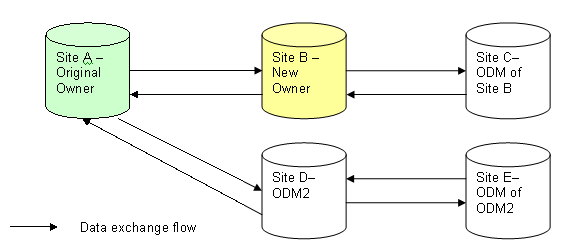Object Ownership Transfer
This section outlines the basic concepts in using Creo Packages for transferring the ownership of an object from the original owner PLM system to a new owner PLM system.
In general, object ownership transfer should happen only once or at most twice in the object’s life. In many cases it may never happen. Object ownership transfer should not be performed casually, and should never be used as an alternative to fulfill an object’s round tripping modification.
Usage Scenario
A typical use case is where a product is collaboratively designed in more than one PLM system. One PLM system may be responsible for a top assembly, while a different PLM system may be responsible for one or more of the subassemblies. Read-only collaboration is established based on the assumption that only the owner PLM system makes updates to their own Creo Parametric data. A collective decision is made where the original PLM system owner transfers the ownership of an object to a PLM system design partner or supplier whom assumes full responsibility of ownership for that object.
Object ownership transfer allows for the transfer of an object from the original owner to a new owner using a complete package and then a master synchronization package to complete the object ownership transfer.
For example, the original owner sends a complete package for object ownership transfer to the prospective new owner. The prospective new owner imports this package in their PLM system. The new owner sends a master synchronization package to the original owner and other PLM systems that they exchange data with containing the data for this object. In turn, the original owner imports the master synchronization package in their PLM system and sends the master synchronization package to other PLM systems that they exchange data with that contains the data for this object.
The following example illustrates how various PLM systems may interact with each other concerning the design of a product with eventual transfer of the ownership of the object from the original owner PLM system to a new owner PLM system.
This table illustrates how the various PLM systems exchange design information via their collaboration rules. Eventually Site A (original owner PLM system) transfers the ownership of an object to Site B (new owner PLM system).
PLM System Sites | Description |
Site A | Original owner of objects. |
Site B | Prospective new owner of an object. |
Site C | Indirectly exchanges object information with Site A. Directly exchanges object information with Site B. |
Site D | Directly exchanges object information with Site A |
Site E | Indirectly exchanges object information with Site A |
For detailed information about collaboration methodology using
Creo Packages for the transfer of object ownership, see
Collaboration Using Creo Packages.

